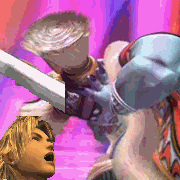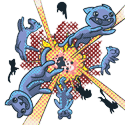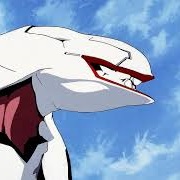|
I can't remember if it's been said but I have a copy of Children of Hurin as well as the Unfinished Tales. Should I skip reading the Narn I Hîn Húrin and it's notes and appendices? Will all of it be in the Children of Hurin. I'm prone to reading both if there's even one Note that's been changed cause I'm clearly that obsessive. The Silmarillion, which I've just finished, is really much easier to read than I had remembered. It was an absolute, though enjoyable, slog back in high school. Today it was a very pleasant series of myths. I still wouldn't recommend to anyone without an interest in mythology or religious studies (I say this more in the stylistic choices "son of so-and-so"), but I would recommend with more ease than I have once before. I'd really love to see an adaptation whether cinematic or otherwise of the Silmarillion it's really quite the epic.
|
|
|
|

|
| # ? May 8, 2024 17:27 |
|
100YrsofAttitude posted:I can't remember if it's been said but I have a copy of Children of Hurin as well as the Unfinished Tales. Should I skip reading the Narn I Hîn Húrin and it's notes and appendices? Will all of it be in the Children of Hurin. I'm prone to reading both if there's even one Note that's been changed cause I'm clearly that obsessive. I think the version in Unfinished Tales is slightly different, but it's skippable. Most of the Unfinished Tales is skippable unless you're really interested in the process Tolkien went through in writing these stories. Children of Hurin is a great read though.
|
|
|
|
100YrsofAttitude posted:I can't remember if it's been said but I have a copy of Children of Hurin as well as the Unfinished Tales. Should I skip reading the Narn I Hîn Húrin and it's notes and appendices? Will all of it be in the Children of Hurin. I'm prone to reading both if there's even one Note that's been changed cause I'm clearly that obsessive. There are definitely process notes in the Narn which are valuable. If you were just reading for the story Children entirel supersedes it. I have sitting on my shelf the book about the composition of the Simarillion. Need to read!
|
|
|
|
I honestly don't want any part of the Silmarillion to ever be adapted. I think it's perfectly fine the way it is, and if it was ever adapted it feels like it might be ruined.
|
|
|
|
The only thing The Silmarillion should ever be adapted into is other books about particular chapters. But then adapt those books into whatever, sure.
|
|
|
|
Yeah I would like the guy that put the first part into comic, to do the whole book. I really like his style.
|
|
|
|
The Ainulindele would work as a Fantasia-esque movie short. Where there's no dialogue, and everything is conveyed by visual metaphor that compliments the soundtrack.
|
|
|
|
Bongo Bill posted:The only thing The Silmarillion should ever be adapted into is other books about particular chapters. But then adapt those books into whatever, sure. I think Tolkien's intention was to eventually write the Silmarillion as a series of books a la The Cildren of Hurin that connected together into one big mythology. It would have been awesome had he lived long enough to finish it. It's too bad Christopher Tolkien refused to let any other authors adapt the stories into into larger novels. In the right hands it could have been great. Canemacar posted:The Ainulindele would work as a Fantasia-esque movie short. Where there's no dialogue, and everything is conveyed by visual metaphor that compliments the soundtrack. Definitely, we'd be able to hear the music of the ainur, and then combine with some high quality animation to show the creation of the world and life, the coming of melkor, and the ensuing battles that resulted. There are ways to make it the adaptation work well. But it's very easy to screw up.
|
|
|
|
Tolkien's translation of Beowulf dropped today, and goodness gracious is it a beautiful thing. Not only the poetic-prose translation itself (in prose form, but with an ear to how long sentences are and to alliteration), but copious footnotes by Christopher Tolkien about the translation and it's composition from the existent manuscripts that JRR had left behind, a couple hundred pages of lecture excepts from JRR's famous lecture series on the poem that are just gorgeous in detail and scope, The Sellic Spell, a piece of Beowulf fan-fiction that JRR wrote about the early adventures of Beowulf/attempt to reconstruct the original tale from which Beowulf is a later version of, and The Lay of Beowulf, a shorter version of the story in verse for singing your children to sleep. This is the good poo poo. I'm not done with it yet, but I'm already enjoying it as much as Seamus Heaney's verse translation, and the commentary is amazing. My only beef is that it doesn't include Beowulf: The Monsters and the Critics, Tolkien's famous lecture about the poem's critics and its place in history, but as that's not really about the poem itself, and it easily available both online and in a separate volume, I can over look it. I read something like this, and I wish all writers could be so served by their heirs. Brian Herbert, I'm looking in your direction... Toph Bei Fong fucked around with this message at 07:03 on May 23, 2014 |
|
|
|
Yeah, but I think his son pretty much gave up his life so he could sort through his dad's notes. I wouldn't wish that on anybody.
|
|
|
|
Gologle posted:Yeah, but I think his son pretty much gave up his life so he could sort through his dad's notes. I wouldn't wish that on anybody. Christopher didn't give up his life. He had a full life that included a family and a career in academia that involved working with and translating ancient texts. At his fathers passing he inherited a steady stream of wealth which could have allowed him to retire in comfort at. 50. Instead he used his talents towards creating one of the most astounding pieces of literary analysis. An immeasurable gift to scholars and fans alike. Brian Herbert used his father's name to sell his lovely Dune fanfic.
|
|
|
|
rypakal posted:Brian Herbert used his father's name to sell his lovely Dune fanfic. Which is why I'm glad Christopher Tolkien didn't license out his fathers work, I think a person is fooling themselves if they think letting other authors write stuff out of the Silmarillion would have turned out well.
|
|
|
|
People should always want more. All of the incomplete or unelaborated stories in Tolkien's notes are a better completion of his project than a constant stream of mass-market reimaginings would be. He meant to make a mythology, and mythologies leave your imagination with patches to work in. Chris T. seems to get this, thank Eru.
|
|
|
|
So who do you guys prefer as a Dark Lord/Villain - Morgoth or Sauron? Tolkien's view of Morgoth vs. Sauron I like Sauron well enough but I have always preferred Melkor. I read The Sil before LOTR and in many wyas Morgoth is the most important character in The Sil. His "fall" is so much more detailed than Sauron's is. I in fact came to pity him and my pity only grew when reading Tolkien's idea of him. The difference between Sauron and Morgoth is the difference between wanting the possible and he impossible you might say. Sauron could have easily conquered Middle-earth if not for dumb luck/Providence. Morgoth though could never have achieved his dream. All the way from before the beginning of Creation to his final days he was longing for a dream that he could never realize. When thinking about all this, I also recalled a quote from The Sil that I feel perfectly encapsulates the character of Melkor/Morgoth: "In Angband Morgoth forged himself a great crown of iron, and he called himself King of the World. In token of this he set the Silmarils in his crown. His hands were burned black by the touch of those hallowed jewels, and black they remained ever after; nor was he ever free from the pain of the burning, and the anger of the pain. That crown he never took from his head, though its weight became a deadly weariness." This has always been one of my favorite quotes in the series. Others might ask "what was the point of all this? He chose to live in perpetual agony because of some gems? And he will never ever remove a crown no matter how much it ails him?" But that, in essence, is Morgoth. Foolish and stupid these things seem to us and hardly any of it is practical. Sauron at the least was much more pragmatic than his master. But Morgoth wanted all and he would have all, even if it destroyed him.
|
|
|
|
I felt pity for melkor from the beginning of reading the creation of arda, I don't see him as evil in the beginning and you could say the way he became after was because of how he was treated and separated in a way from his fellow valar. If anything it was not that he was evil but that eru had made a mistake in creating a being so similar to himself. Wasn't Melkor basically hated for singing his own tune during the song of creation (oversimplification, I know) Which wasn't exactly his fault as he was first to be created and was made to be most like Eru. He was the smartest of the valar and wanted to find the flame imperishable so that he too could create. (once again, not his fault if he was created to be most like eru. This is also obviously a reference to fire being the first technology and the curiosity that allowed man to find it) What he created he saw as beautiful but Eru (and the rest of the valar by proxy) did not like what he had created and the arrogance, I guess, to create something of your own. He rebuked melkor for doing so and shamed him. I see him as what religious people see an atheist. Defiant and dancing to the beat of their own drum instead of somebody else's. I always liked the religious parallels in The Silmarillion. I love Tolkiens books but it's been a year or two since I've read any. Time to re-read The Sil! Catsplosion fucked around with this message at 14:51 on Jul 7, 2014 |
|
|
Catsplosion posted:I felt pity for melkor from the beginning of reading the creation of arda, I don't see him as evil in the beginning and you could say the way he became after was because of how he was treated and separated in a way from his fellow valar. If anything it was not that he was evil but that eru had made a mistake in creating a being so similar to himself.
|
|
|
|
|
All true but he was created as most intelligent of all valar amongst over characteristics. Was it not a fault by eru to have created him that way and not his own? I agree though. As time went on he became more arrogant and self-consumed which led to his downfall. It all depends on the first of the things he made. If he created them to rule them and made them the way they were for that purpose then he was evil but they could have just been pale imitations of what eru had created, not unlike Aulë's dwarves.
|
|
|
|
I interpret the defining characteristic of Melkor as an obsession with the possibility of things existing that do not originate with God. Before the Music, he wandered out into the Void, far away from the other Ainur. Before being sent into the world, Iluvatar admonishes him that he'll see that nothing can exist "that hath not its uttermost source in [Him]." Finding that there was nothing except what God made, he tried to make it himself - and failed, in his arrogant presumption that anything could be God's equal.
|
|
|
Catsplosion posted:All true but he was created as most intelligent of all valar amongst over characteristics. Was it not a fault by eru to have created him that way and not his own?
|
|
|
|
|
Yes but why did he become an rear end in a top hat.
|
|
|
|
SHISHKABOB posted:Yes but why did he become an rear end in a top hat. Because Eru was a smug prick to him?
|
|
|
|
Canemacar posted:Because Eru was a smug prick to him? Eru did't like braying trumpets. I don't blame him.
|
|
|
|
Tolkien was a devout Christian, and the worst of the Seven Deadly Sins is Pride. Everyone who turned to evil, did it because of pride.
|
|
|
|
He tried three different ways to dominate the Music of the Ainur, but none of the Ainur, not even Melkor, understood that the song described the future of the world they would be living in. Melkor sang his own destiny, which he could not defy. Ea itself is partly intended to teach Melkor his lesson; because he did not cease his discord before the end of the song, he can't choose harmony until the end of the world.
|
|
|
SHISHKABOB posted:Yes but why did he become an rear end in a top hat.
|
|
|
|
|
Nessus posted:At a certain point we enter the context of where moral responsibility lies. At a certain point you go from "wanting to assert your own vision" to "I am being an obstinate prick and just loving things up for spite," which Melkor presumably crossed while pouring poison in Feanor's ear. I do not disagree with you, I think after a point he was irredeemable. But I do not believe that he was inherently evil from the start. Unless you consider having "pride" to be evil, which is an argument to make since too much pride often leads to doing a lot of bad things.
|
|
|
|
It wasn't pride so much as a desire or compulsion to create and own. Hence his desire for the Silmarils which are probably the greatest creation not done by Eru. The same compulsion, the desire to create and control, was present in Sauron. And Feanor, peace be upon him. Edit The Silmarils are a metaphor for creation itself. They are a fantastic literary invention. Just splendid. euphronius fucked around with this message at 01:57 on Jul 8, 2014 |
|
|
|
I honestly found Feanor more despicable than either Dark Lord or Saruman or any other villain. And I've had people try to tell me he wasn't a villain. Even as they say "oh sure, he attacked his fellow elves and murdered them to steal their stuff but it's just because he was a spirti of fire and stuff!" Honestly Feanor caused as much death as the Dark Lords. Or, at the very least, he caused more death than anyone besides them. SHISHKABOB posted:Yes but why did he become an rear end in a top hat. The Silmarillion is Biblical almost in its Omniscient Morality. God committed genocide on the Numenoreans and not just the ones attacking the Undying Lands. There were probably helpless women and children on the island when he saw fit to crush it. What's more, Manwe, Melkor's brother, is described as not even comprehending selfishness or evil. Therefore how can he be "Good' compared to Melkor who obviously could think more wholly? Manwe isn't Good - he's a robot, programmed to act a certain way. Personally the line earlier about how Eru said everything came back to him no matter what you do or thought struck me as him saying 'Evil" is a force for good in the end. No matter how much carnage Melkor and Sauron did, they were ultimately doing Eru's Will. As such, how is it even their fault? Also consider this quote quote:There was Eru, the One, who in Arda is called Ilúvatar; and he made first the Ainur, the Holy Ones, that were the offspring of his thought Could you not interpret that as Melkor embodying Eru's own Pride? But...yeah, this gets into heavy Nature of Evil and Free Will and God and all sorts of sticky things we have no answer for. But as much as I love The Sil I just can't agree with its presentation and the morality it conveys. My personal thought about why Melkor turned to evil though is exactly what Tolkien said - he went mad with longing. Is it not the son's most natural inclination to emulate the father? Or even to surpass said father? Melkor is Eru's "son" as it were and he wanted desperately to be his own master just like his dad. But it was impossible. Eventually he just came to resent everything. When the Vala first come to Arda they try to build stuff and Melkor just wrecks all of it out of spite. His quest for creation had turned to a quest for annihilation. NikkolasKing fucked around with this message at 23:34 on Jul 8, 2014 |
|
|
I don't wholly subscribe to the Silmarillion's take on morality either, though to be honest it seems to get across its actual moral lessons more clearly than the Bible.NikkolasKing posted:My personal thought about why Melkor turned to evil though is exactly what Tolkien said - he went mad with longing. Is it not the son's most natural inclination to emulate the father? Or even to surpass said father? Melkor is Eru's "son" as it were and he wanted desperately to be his own master just like his dad. But it was impossible. Eventually he just came to resent everything. When the Vala first come to Arda they try to build stuff and Melkor just wrecks all of it out of spite. His quest for creation had turned to a quest for annihilation.
|
|
|
|
|
Aule is indeed said to be the most like Melkor in thought and what's also interesting to note is that the other two most important traitorous Ainur - Sauron and Saruman - were specifically said to be Maia of Aule. My guess is Tolkien was trying to say something there but I'm not sure what. Perhaps something about the nature of creation... In the act of making something you tend to feel like you have dominion over it and are thus your own master or even god. (Sauron was worshiped as one in the Third Age) And I'm not trying to portray Melkor as a complete victim here. He killed and tortured Eru knows how many people and creatures. If I had to serve under any Dark lord I'd rather it be Sauron than Morgoth. I just feel pity for Morgoth because he had an impossible wish from the very beginning. EDIT: I forgot we've been over all this before in this thread. http://forums.somethingawful.com/showthread.php?threadid=3532243&userid=0&perpage=40&pagenumber=9#post425148441 An excellent post with a quote from Tolkien on the whole creativity thing. NikkolasKing fucked around with this message at 02:20 on Jul 9, 2014 |
|
|
|
I think there's something to the theory that Melkor loved Varda and she spurned him in favor of Manwe, and everything after is a result of Melkor's broken heart.
|
|
|
|
Melkor was clearly "bad" before that though. From the minute he played his own chords in the creation song. I think he represents aspects of a whole and will always play to those aspects. It's his nature.
|
|
|
|
Melkor/Morgoth functions as a Lucifer/Satan figure in the Silmarillion (and in the wider Legendarium: c.f. the reference in the Lord of the Rings to Sauron being an emissary or servant - I forget which word was used but I think the first? - of a greater power, and the whole business of Morgoth worship - complete with human sacrifice - in the last years of Numenor) and his Fall should probably be interpreted in similar terms. It was caused by a wish to dominate Creation and by various attempts to do so; as only Eru (i.e. God) is permitted this power, such actions are a rebellion against God, the greatest of sins to traditional Christian thinking. Morgoth's subsequent wars against Creation and his many other attempts to pervert it (the creation of the Orcs, or his role in the Fall of Man: which Tolkien made explicit but never described in detail) can be seen as an intensification of this rebellion.
|
|
|
|
concerned mom posted:Melkor was clearly "bad" before that though. From the minute he played his own chords in the creation song. I think he represents aspects of a whole and will always play to those aspects. It's his nature. Which means that Eru made him bad and was bad himself. He was created by him and in his image. I think Sibboleth hits the nail on the head though. In terms of tolkiens thinking he was definately playing the lucifer role. An angel who rebelled against god due to pride, arrogance, intellect, beauty, etc. Bongo Bill posted:I interpret the defining characteristic of Melkor as an obsession with the possibility of things existing that do not originate with God. Before the Music, he wandered out into the Void, far away from the other Ainur. Before being sent into the world, Iluvatar admonishes him that he'll see that nothing can exist "that hath not its uttermost source in [Him]." Finding that there was nothing except what God made, he tried to make it himself - and failed, in his arrogant presumption that anything could be God's equal. He wandered into the void to find the flame imperishable so that he himself could create. The christian parallels that are rooted in the lore of the lord of the rings make it even more interesting to read as christianity itself is such a great fairy tale. Not that I think one should beleive them, but they are interesting nevertheless. The only problem that brings is that in talking about the lore of the books people end up arguing about religion 
Catsplosion fucked around with this message at 19:29 on Jul 10, 2014 |
|
|
|
I always just think that Eru is God and like any being he he aspects of pride, arrogance, intellect, beauty, etc within himself. We can see with the other lesser gods in the pantheon that they all have distinct personalities and typical behaviours. Sadly for Morgoth his was for the most part emotions and sentiments we deem as bad. Am I oversimplifying it?
|
|
|
concerned mom posted:I always just think that Eru is God and like any being he he aspects of pride, arrogance, intellect, beauty, etc within himself. We can see with the other lesser gods in the pantheon that they all have distinct personalities and typical behaviours. Sadly for Morgoth his was for the most part emotions and sentiments we deem as bad. Am I oversimplifying it? One of the aspects of Tolkien's stuff that I think breaks from the strict tradition of most theological stuff is that it focuses on the inherent worth and value of the little things. The Shire is the obvious example in LOTR, and while I think his rosy view of Merry England was a lot of that, the greater creative point is that this place with all its fussy little rituals and social dynamics, while perhaps in need of improvement, had value in its own right. Yavanna talks to Eru (or was it Manwe?) about her concern for the creatures and plants of Middle-Earth and gets told "these things have worth in themselves even if there were no intelligent beings to come." From this perspective I guess Melkor's flaw was that he did not bother to even try to understand the greater part of the music, nor did he start going rogue after exhaustively examining every aspect of things; he wanted the power to create from nothing, but did not have much regard for what would be created (even if he could). Compare Aule to the Dwarfs with Melkor and the Orcs.
|
|
|
|
|
Nessus posted:... I agree it's hard to have a meaningful conversation about Tolkien's mythology without having a conversation about religion. It's a testament to his writing--and perhaps the strength and resonance of his themes--that his stories are nonetheless approachable by those of many faiths.
|
|
|
Ynglaur posted:I can't speak to Buddhism, Hindu, or many pre-Christian Western religions, but the concept of the inherent worth of even small things is found in Roman Catholicism, which makes perfect sense given Tolkien's upbringing and morality. While the powerful and wise are great in worldly things, they are often the most tempted by worldly things, and thus must strive harder for holiness (i.e. being like God (or Eru)). Those who are humble and small are thus closer to holiness, and thus in their way are greater than those who are greater in stature. You see this in Catholicism in the parable of the widow who gave her last 2 coins to the Temple; or in Mother Teresa's opinion that the face of Jesus is in that of a leper.
|
|
|
|
|
The bizarre (and interesting) thing about Tolkien's Legendarium is it blends his Catholicism with other things. The Silmarillion is very much about the greatest of the great, the strongest of the strong and so-on, all decked out in fabulously amazing gems and robes and everything else you could imagine. It's a tale of the best Men and Elves and Dwarves ever to exist and their glorious battles and defeats. From what I understand and have been told by people smarter than I is all to do with the concept of "Fey." quote:the word "fey" in this instance, a concept (O.E. faege) that is an outcome of "weird" or fate, that an Anglo-Saxon warrior like Beowulf would certainly understand. To become fey is to foresee one's own death and against all counsel seek that death, usually in battle against impossible odds, and die gloriously. (I was told this was a decidedly un-Christian idea) Fingolfin was "fey" when he challenged Morgoth for example. Now some people I've talked to say Fingolfin was foolish and perhaps even suicidal to do this but it isn't supposed to make logical sense. The entire fight of the Noldor was just as hopeless as Fingolfin's single combat with Morgoth but we're supposed to revere them and sing their praises. (not that I'm saying we shouldn't - Fingolfin was awesome) Interestingly, Tolkien put a spin on the Noldor's battle that made it not completely in vain: "If we consider the situation after the escape of Morgoth and the reëstablishment of his abode in Middle-earth, we shall see that the heroic Noldor were the best possible weapon with which to keep Morgoth at bay, virtually beseiged, and at any rate fully occupied, on the northern fringe of Middle-earth, without provoking him to a frenzy of nihilistic destruction. And in the meanwhile, Men, or the best elements of Mankind, shaking off his shadow, came into contact with a people who had actually seen and experienced the Blessed Realm" Had Melkor not been distracted for an Age he might have spiraled completely out-of-control and just wrecked everything he could. NikkolasKing fucked around with this message at 06:34 on Jul 11, 2014 |
|
|
|

|
| # ? May 8, 2024 17:27 |
|
Tolkien essentially started with non-christian Northern myths and slowly over his life brought them closer to reality and to Catholic Theology. It was both an understandable motive and a great tragedy to the inventiveness when he took it too far. (Losing the Tale of the Sun and the Moon entirely would have been the greatest loss, imho). In the unfinished state a lot of things are in flux and unanswered.
|
|
|



































